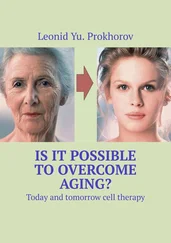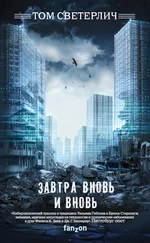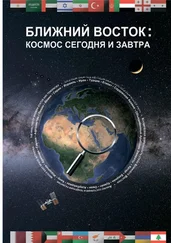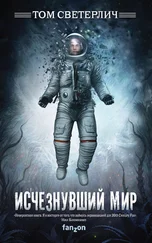“Dominic? Oh, God,” he says. “Oh, thank God, Dominic—”
I tell him what’s happened. I tell him I’m all right. I tell him I don’t know what to do. He asks whether I’m able to buy a ticket to London, if he needs to come to get me or if I can meet him there.
“I think I can make it on my own,” I tell him.
October twenty-first—
Eleven years since the end—
Gavril met me at Heathrow—I’d bought a one-way ticket from Youngstown-Warren to London with cash, a purchase that ruffled the TSA screeners. The ersatz passport left in the duffel bag of cash worked well enough, though—scanned in Youngstown-Warren, Cleveland and Atlanta, then again at customs in London without a hitch. Flocks of baggage-laden travelers sprinted through Heathrow’s labyrinthine corridors to make their connections, but I stayed well to the edges to let them pass, taking my time, strolling those ramps and walkways gingerly with my cane. Gavril didn’t recognize me at first, I’m so much skinnier now and the injury to my eye skews my face, but when he heard my voice at baggage claim he hugged me and cried, refusing to let me go even as other passengers scrambled around us. Kelly was with him—I’d been nervous to see her, thinking of Zhou, but she’d cut her hair into a platinum bristle of pixie spikes, looking nothing like the version of herself in the Archive.
Six days catching up with Gavril and Kelly in their Chelsea flat before he purchased three tickets from Heathrow to the Václav Havel airport in Prague, and rented a private car to Domažlice to his mother’s farm. We arrived at dusk, the floods illuminating the unpainted plank wood of my aunt’s barn, the house lights lit, the surrounding fields red-gold furrowed with black. My aunt waited for us on the front porch in an ink- and paint-stained smock, her hair a springy bush of graying corkscrews. She hugged me and cried, just like Gav, then fed us dish after dish she’d made throughout the day, pork chops and cabbage, potatoes and spinach and apple strudel. Kelly picked at her food, but Gav and I ate like we’d been starved in exile, finishing with coffee and then cognac out on the front porch, watching night coalesce over the fields. The back den was made up as a guest room for me, with a foldout sofa bed and a small desk. I slept, comfortable and feeling safe, my body releasing the shock of the past several months—I slept through two full days, only blearily emerging to use the bathroom before crawling back underneath the covers, curling back into bed. By the time I woke up, Gavril and Kelly had already returned to London.
—
The doctors here in Domažlice tell me I’ll limp for life without further surgeries, but even then there aren’t guarantees. I take walks every other day, usually around the perimeter of the fields, to build strength and get used to my limp and the dull ache of my weight.
My aunt takes breaks from her work usually by the time I finish up one of my longer walks, so I’ll often hitch a ride with her into town, a twenty-five-minute drive through the countryside before the narrow flagstone streets of Domažlice. The buildings here sit in long rows tight against the edges of the streets, ancient architecture from the twentieth or nineteenth centuries, maybe earlier, each facade painted a different pastel shade—pinks, yellows, light greens, blues—that make the town radiate cheeriness even as the weather turns bleaker toward winter. My aunt tends to park on Námestí Míru to run her errands, checking in on artist friends for tea or the owner of the gallery she works with. I make my way over to Petr Bocan for a pilsner, sitting under the yellow awnings when I can or moving inside if it’s too cold. The place is a sports bar, and even though I’m not interested in soccer, I find the background noise helps me turn inward—I’m exotic here, an American, but no one cares as long as there’s a game on. Once my belly feels warm, I make my way over to the Bozen public library to check out one of their tablets and access the streams. I try to keep up with Simka, to follow what’s happening to him. I’ve gathered what information there is about his arrest and trial—but there’s nothing much, nothing truly substantial. When she’s finished with her errands, my aunt finds me in the library—sometimes we’ll swing back to Petr Bocan’s for pork chops, or we’ll just head home where I help her cook.
I keep a filing cabinet for all the printouts I’ve made at the library—cached streams about Simka’s case, commentaries from DC legal analysts. I bought a whiteboard just like Kucenic’s that I’ve filled with starting points, suppositions about what might have happened, how I can prove that Waverly framed Simka, but I can’t figure it out—there’s nothing, no leads. Without Adware, I’ve taken to writing Simka letters, actual letters, addressing them care of his prison—I don’t know if he receives them or not. I never write a return address, I never specify who I am and am careful to leave out details of my life. I write about my recovery, mostly, that I use a cane when I walk, that my hand never healed correctly.
After one of my walks around the field, I pour myself coffee and cook up toast and a scrambled egg. My aunt joins me, splits her grapefruit with me, and asks if I’d like to go out to the studio with her.
“You want to see?” she asks, her English much better than Gav’s.
“I’d love to,” I tell her.
My aunt’s converted the barn into a print shop—nothing too fancy, just drywall and space heaters, a raised floor in case there’s ever a leak, fluorescent tubes like a lattice of light suspended from the roof slats. She opens the wide double doors for fresh air, but even so the place smells like ink and astringent chemicals, old wood and wet hay. Gavril used this barn as his studio when he was making art, and some of his things are still here, stashed in the corner—televisions, speaker parts, old computers still in their boxes. The rest of the barn is taken up with my aunt’s printing equipment—several presses of different sizes, cabinets filled with a rainbow of ink.
“Over here,” she says, leading me to her worktable—a massive wood slab with benches suitable for a mead hall. She’s a wood-block printer primarily, and her worktable’s covered with carving tools and wood panels for different steps of the layered printing process. Her work is fanciful, hyperdetailed, lush—mostly children’s book illustrations. She’s working on a series for a new Czech translation of the Brothers Grimm.
“I’ll use you as a model for the good prince,” she says. “He loses his eyes in the brambles, no? So I’ll model him after you, put your troubles with your eye to some good use—”
“All right, but my modeling work doesn’t come cheap—”
“I know, I know,” she says. “Strudel. More strudel—”
She’s especially interested in showing me a press she calls her “jobber,” a cast-iron old thing that looks like an overgrown typewriter.
“Letterpress,” she says. “For your poetry. You can work when I work—”
My aunt hands me two keys on a ring, the smaller key for the type-case drawers, the larger for the cabinet stocked with her expensive paper. “Here,” she says, pulling a drawer from the type case and setting it on a secondary worktable near the jobber—the drawer’s filled with metal blocks, each bearing a letter in a different font, capitals and lowercases.
“Easy,” she says, showing me how to fit each letter into the composing stick, how to tie off the galley. She spells out John Dominic Blaxton lives here , then shows me how to ink the letters and run it through the press.
“For your door,” she says, handing me the print. “Now you try. Something simple for first one—”
Читать дальше
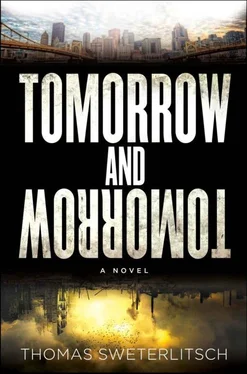

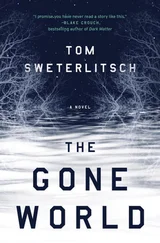
![Том Светерлич - Завтра вновь и вновь [litres]](/books/401288/tom-sveterlich-zavtra-vnov-i-vnov-litres-thumb.webp)
![Том Светерлич - Исчезнувший мир [litres]](/books/420722/tom-sveterlich-ischeznuvshij-mir-litres-thumb.webp)
